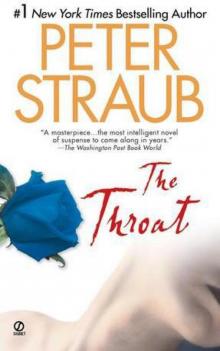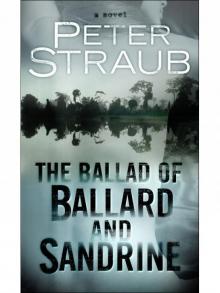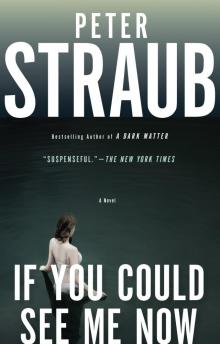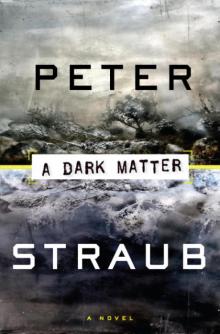- Home
- Peter Straub
Koko brt-1 Page 13
Koko brt-1 Read online
Page 13
Pun Yin stood beside Michael with her arms angelically outstretched, floating a blanket down over Conor Linklater’s body. In 1967, a girl with a blonde pageboy tapped his arm to awaken him, grinned brightly over his shoulder, and told him to prepare for descent. His guts felt watery. When the stewardess opened the door, hot moist air invaded the aircraft and Michael’s entire body began to sweat.
Nat Beasley lifts a heavy brown plastic bag from the trunk of a Lincoln town car and drops it into a deep trench between two fir trees. He takes a second, lighter bag from the trunk and drops it on top of the first.
The heat, Michael knew, would rot the shoes right off his feet.
Pun Yin switched off his reading light and closed his book.
3
The General, who was now a storefront preacher in Harlem, had left Tina alone with Maggie for a moment in the clutter of his ornate living room on 125th Street and Broadway. The General had been a friend of Maggie’s father, apparently also a general in the Formosan army, and after General Lah and his wife had been assassinated, the General had brought her to America—and this stuffy apartment in Harlem had been where Maggie had fled! It was a puzzle, a relief, an irritation.
For one thing, his girlfriend turned out to be the daughter of a general. This explained a lot about Maggie: she came by her pride naturally; she was used to getting her own way; she liked to speak in communiqués; and she thought she knew all about soldiers.
“Didn’t you think I was worried about you?”
“You don’t mean worried about me, you mean jealous.”
“What’s wrong with that?”
“Because you don’t own me, Tina. And because it only works when I’m gone and you don’t know where I am. You’re like a little boy, you know?”
He let that one pass.
“Because when I live with you, Tina, you wind up thinking that I’m this half-crazy little punk who really just gets in the way of thinking about business and hanging out with the guys.”
“That just says that you’re jealous, Maggie.”
“Maybe you’re not so dumb after all,” Maggie said, and smiled at him. “But you have too many problems for me.” She was sitting on an ornately brocaded couch with her legs folded under her, wrapped in some loose flowing dark woolen thing that was as Chinese as the couch. The smile made Tina want to put his arms around her. Her hair was different, less scrappy, more like a smooth thatch. Tina knew how Maggie’s heavy silky hair felt in his hands, and he wished he could ruffle it now.
“Are you saying you don’t love me?”
“You don’t stop loving people, Tina,” she said. “But if I moved back in with you, pretty soon you’d be secretly wondering how you could get rid of me—you’re so guilty, you’ll never let yourself get married to anybody. You’ll never even get close.”
“You want to marry me?”
“No.” She watched his suspicious, surprised response. “I said, you have too many problems for me. But that’s not the point. How you behave is the point.”
“Okay, I’m not perfect. Is that what you want me to say? I’d like you to come back downtown with me, and you know it. But I could just as well walk away right now, and you know that too.”
“Think about this, Tina. When I was putting all those ads in the Voice for you?”
He nodded.
“Didn’t you like seeing them?”
He nodded again.
“You looked for them every week?”
Tina nodded yet again.
“Yet you never even considered putting one in yourself, did you?”
“Is that what this is about?”
“Not bad, Tina. I’m glad you didn’t say you were too old for that sort of thing.”
“Maggie, a lot of things are going wrong right now.”
“Did the city close Saigon?”
“I closed it. It was getting to be impossible to cook and kill bugs at the same time. So I decided to concentrate on killing bugs.”
“As long as you don’t get mixed up and start cooking them.”
Annoyed, he shook his head and said, “It’s costing me a ton of money. I’m still paying a lot of salaries.”
“And you’re sorry you didn’t go to Singapore with the little boys.”
“Let’s put it this way. I’d be having more fun than I am now.”
“Right now?”
“Now in general.” He looked at her with love and exasperation, and she looked calmly back. “I didn’t know you wanted me to put ads in the Voice too—otherwise I would have. It never occurred to me.”
She sighed and raised a hand, then slowly let it fall back to her folded knees. “Forget about it. But just remember that I know you a lot better than you’ll ever know me.” She gave him another calm look. “You’re worried about them, aren’t you?”
“Okay, I’m worried about them. Maybe that’s why I wish I was with them.”
She slowly shook her head. “I can’t believe that you get half-killed and think that you should be able to go on the way you did before—like nothing happened.”
“Plenty happened, I don’t mind admitting it.”
“You’re scared, you’re scared, you’re scared!”
“Okay, I’m scared.” He exhaled noisily. “I don’t even like going out alone in the daytime. At night I hear noises. I keep thinking—well, weird shit. About Nam.”
“All the time, or just at night?”
“Well, I can catch myself thinking weird shit at any time of the day or night, if that’s what you mean.”
Maggie swung her legs out from beneath her. “Okay, I’ll come down and stay with you for a while. As long as you remember that you aren’t the only one who can walk away.”
“How the hell could I forget that?”
And that was all it took. He did not even have to confess to her that right before he had come uptown, he’d been standing in his kitchen holding a bottle of beer and for a second had known that it was Ba Muy Ba and that the bullet with his name on it, the one that had missed him all those years ago, was still circling the world, homing in on him.
The General who was now a preacher stared at Tina just as if he was still a pissed-off general, and then barked a few words at Maggie in Chinese. Maggie answered with a phrase that sounded sullen and adolescent, and the General proved to Tina once and for all that he would never comprehend the Cantonese language by beaming at Maggie and taking her in his arms and kissing the top of her head. He even shook Tina’s hand and beamed at him too.
“I think he’s happy to get rid of you,” Tina said as they waited for the slow-moving, odorous elevator.
“He’s a Christian, he believes in love.”
He could not tell if she were being sardonic or literal. This was often the case with Maggie. The elevator clanked up to the General’s floor and opened its mouth. A sour stench of urine rolled out. He could not let Maggie see that he was afraid of the elevator. She was already inside, looking at him intently. Tina swallowed and stepped into the reeking mouth of the elevator.
The doors slammed behind him.
He managed to smile at Maggie. Getting inside was the hardest part.
“What did he say to you, just before we left?”
Maggie patted his hand. “He said you were a good old soldier, and I should take care of you and not get too mad at you.” She glinted up at him. “So I told him you were an asshole and I was going back with you only because my English was getting rusty.”
Downstairs, Maggie insisted on taking the subway, and demonstrated that she could still do an old trick of hers.
They had reached the top of the steps and were moving toward the token booth. The wind cut through his heavy coat and lifted the hood against the back of his head. When he looked around for Maggie and did not see her, the moment filled with a bright dazzle of panic.
A noisy knot of boys in black jackets and knit caps, one of them toting a huge radio, were punching the air and bopping along the platform in time
to a Kurtis Blow song. Black women in heavy coats leaned against the railing and paid them no attention. Far ahead, a few men and women stared almost aimlessly down the tracks. Tina was suddenly, painfully aware of how high up in the air he was—suspended like a diver on a board. He wished that he was holding onto a railing—it was as if the wind could lift him off the platform and smack him down onto Broadway.
He had automatically fallen into line at the token booth. The boys had collected up at the head of the platform. Tina reached into his pocket, furious with Maggie for disappearing and furious with himself for caring.
Then he heard her giggle, and he snapped his head sideways to see her already past the turnstile and out on the platform beside the impassive women. Her hands were shoved deep in the pockets of her down coat, and she was grinning at him.
He got his token and went through the turnstile. He felt absurdly tangible. “How did you do that?”
“Since you wouldn’t be able to do it anyhow, why should I tell you?”
When the train roared up before them, she took his hand and pulled him into the subway car.
“Are they in Singapore yet?” she asked him.
“They got there three or four days ago, I think.”
“My brother says they’re going to Taipei too.”
“I guess it’s possible. They’ll go wherever they have to go to find Underhill.”
Maggie gave him a half-scathing, half-sympathetic look. “Poor Tina.” She took Tina’s hand into her soft, down-padded lap.
He sat beside her in the loud train, his fear now mostly under control. No one was staring at him. His hand rested within both of Maggie’s funny little hands, in her lap.
South they flew beneath Manhattan in the filthy train, Maggie Lah with her large secret feelings and Tina Pumo with his, which ran queerly parallel to those of his friends under the patient gaze of Pun Yin. I love Maggie and I am afraid of that. She’s a kind of original. She leaves me in order to keep me, she’s smart enough to get out before I kick her out, and she proves it by coming back as soon as I really need her. And maybe Underhill is crazy and maybe I’m crazy too, but I hope they find him and bring him back.
Here is Tim Underhill, Tina thought, here is Underhill out in a section of Camp Crandall known familiarly to the madmen of the good old Rearing Elephant as Ozone Park. Ozone Park is a bleak section of wasteland about the size of two city blocks between the rear of Manly’s “club” and the wire perimeter. Its amenities consist of one piss-tube, which provides relief, and a huge pile of empty metal barrels, which offers shade and a pervasive smell of oil. Ozone Park does not officially exist, so it is safe from the incursions of the Tin Man, for whom, in true army fashion, should exactly equals is. Here is Tim Underhill, in the company of a number of comrades wasted on Si Van Vo’s 100s and getting more wasted on a little white powder Underhill has produced from one of his pockets. Here is Underhill recounting to all the others, who include besides myself, M.O. Dengler, Spanky Burrage, Michael Poole, Norman Peters, and Victor Spitalny, who just lurks around the edges of the barrels, now and then tossing little stones toward the others, the tale of the running grunt. A young man of good family, Underhill says, the son of a federal judge, is drafted and sent to good old Fort Sill in beautiful Lawton, Oklahoma.…
“I sure get sick of the sound of your voice,” sneers Spitalny from off to the side, near the barrels. He flings a stone at Underhill and strikes him in the middle of his chest.
“You’re still nothing but a fucking queer,” Spitalny says.
—And you’re still a shithead, Pumo remembers saying eloquently to Spitalny, who returned the favor by throwing a stone at him, too.
It took a long time to adjust to the “flowers,” because it took a long time to understand that Underhill never corrupted anybody, that he could not corrupt anybody because he himself was not corrupt. Though most of the soldiers Puma knew claimed to despise Asian women, nearly all of them used whores and bar girls. The exceptions were Dengler, who clung to his virginity in the belief that it was the talisman that kept him alive, and Underhill, who picked up young men. Pumo wondered if the others knew that Underhill’s flowers were in their early twenties, and that there had been only two of them. Pumo knew this because he had met them both. The first was a one-armed former ARVN with a girl’s face who lived with his mother in Hue and made a living grilling meat at a food stall until Underhill began to support him. The other flower actually worked in the Hue flower market, and Pumo had eaten dinner with the young man, Underhill, the young man’s mother, and his sister. He had seen such a remarkable quantity of tenderness flow among the other four people at the table that he would have been adopted by them if he could. Underhill supported this family, too. And now in an odd way Pumo supported them, for when Underhill’s best-loved flower, Vinh, finally managed to locate him in New York in 1975, Pumo remembered the excellence of the meal as well as the warmth and kindness in the little house, and hired him. Vinh had undergone deep changes—he looked older, harder, less joyous. (He had also fathered a child, lost a wife, and served a long apprenticeship in the kitchen of a Vietnamese restaurant in Paris.) None of the others knew Vinh’s history. Harry Beevers must have seen him once with Underhill and then forgotten the occasion, because for reasons of his own Beevers had convinced himself that Vinh was from An Lat, a village near Ia Thuc—whenever Beevers saw either Vinh or his daughter, he began to look persecuted.
“You look almost happy now,” Maggie said to him.
“Underhill can’t be Koko,” Tina replied. “The son of a bitch was crazy, but he was crazy in the sanest possible way.”
Maggie did not say or do anything, did not change her grip on his hand, did not even blink at him, so he could not tell if she had heard him. Maybe she felt insulted. The noisy subway clattered into their station and came to a jerky stop. The doors whooshed open, and Pumo froze for a second. As the noises outside the car resolved themselves, Maggie pulled him to his feet. When Pumo got out of the train he bent over and hugged Maggie as hard as he could.
“I love you too,” she said. “But I don’t know if I’m being crazy in a sane way, or vice versa.”
She gasped when they turned into Grand Street.
“I suppose I should have prepared you,” Pumo said.
Stacks of bricks, piles of boards, bags of plaster, and sawn lengths of discarded pipe covered the sidewalk outside Saigon. Workmen in green parkas and heavy gloves, heads bent against the wind, wheeled barrows of rubble out of the front door and laboriously dumped them into a skip. Two trucks stood double-parked beside the skip, one marked with the name SCAPELLI CONSTRUCTION CO., the other bearing the stenciled legend MCLENDON EXTERMINATION. Men in hard hats wandered back and forth between the restaurant and the trucks. Maggie saw Vinh talking to a woman holding a wide set of unrolled blueprints, and the chef winked at her, then waved at Pumo. “Must talk,” he called out.
“What’s it like inside?” Maggie asked.
“Not as bad as it looks from here. The whole kitchen is torn apart, of course, and most of the dining room is too. Vinh’s been helping me out, cracking the whip when I’m not around. We had to take down the whole back wall, and then we had to rebuild some of the basement.” He was fitting his key into the white door next to Saigon’s door, and Vinh shook the architect’s hand and came over in a rush before he could open it.
“Nice to see you again, Maggie,” Vinh said, and followed it with something in Vietnamese to Pumo. Tina answered in Vietnamese, groaned, and turned to Maggie with increased worry plain on his face.
“Floor fall down?”
“Someone broke in this morning. I haven’t been in since about eight, when I went out to get breakfast and check in with some suppliers. We’re expanding the kitchen, as long as we have to do all this work, and as usual I have to chase around all over the place, which I was doing until I was stopped in my tracks by the back page of the Village Voice.”
“How could anybody break in with all this
going on?”
“Oh,” he said. “They didn’t break into the restaurant. They broke into my loft. Vinh heard someone moving around upstairs, but he thought it was me. Later he went up to ask me about something, and realized that it must have been an intruder.”
Tina looked almost fearfully up the narrow flight of steps that led to his loft.
“I don’t suppose Dracula came back to pay a social call,” she said.
“No, I don’t suppose so either.” Tina did not sound convinced of this. “The bitch might have remembered some stuff she forgot to steal, though.”
“It’s just a burglar,” Maggie protested. “Come on, let’s get out of the cold.” She took a couple of steps up the stairs, then reached down, grasped Tina’s elbows with both hands, and pulled him toward her. “You know when most burglaries are committed, white boy? Around ten in the morning, when the bad guys know everybody else is at work.”
“I know that,” Tina smiled at her. “Honest, I know that.”
“And if little Dracula comes back for your body, I’ll turn her into … hmm …” She rolled her eyes up and stuck a forefinger into her cheek. “Into egg drop soup.”
“Into Duck Saigon. Remember where you are.”
“So let’s go up and get it over with.”
“Like I said.”
He followed her up the stairs to the door of his loft. Unlike the white door downstairs, it was locked.
“One better than Dracula,” Maggie said.
“It locks when you close it. I’m still not sure it wasn’t goddamned Dracula.” Pumo unlocked the door and stepped inside ahead of Maggie.
His coats and outerjackets still hung on their hooks, his boots were still lined up beneath them.
“Okay so far.”
“Stop being such a coward,” Maggie said, and gave him a push. A little way along was the door to his bathroom. Nothing in the bathroom was disturbed, but Pumo had a vivid vision of Dracula standing in front of the shaving mirror, bending her knees and fluffing up her Mohawk.

 Poe's Children: The New Horror: An Anthology
Poe's Children: The New Horror: An Anthology Koko
Koko The Throat
The Throat Julia
Julia Interior Darkness: Selected Stories
Interior Darkness: Selected Stories A Dark Matter
A Dark Matter Floating Dragon
Floating Dragon Houses Without Doors
Houses Without Doors Mr. X
Mr. X Ghost Story
Ghost Story Mystery
Mystery The Ballad of Ballard and Sandrine
The Ballad of Ballard and Sandrine Magic Terror
Magic Terror In the Night Room
In the Night Room Lost Boy Lost Girl
Lost Boy Lost Girl If You Could See Me Now
If You Could See Me Now The Hellfire Club
The Hellfire Club A Dark Matter: A Novel
A Dark Matter: A Novel Koko brt-1
Koko brt-1 Shadowland
Shadowland Mystery brt-2
Mystery brt-2 Interior Darkness
Interior Darkness Poe's Children
Poe's Children